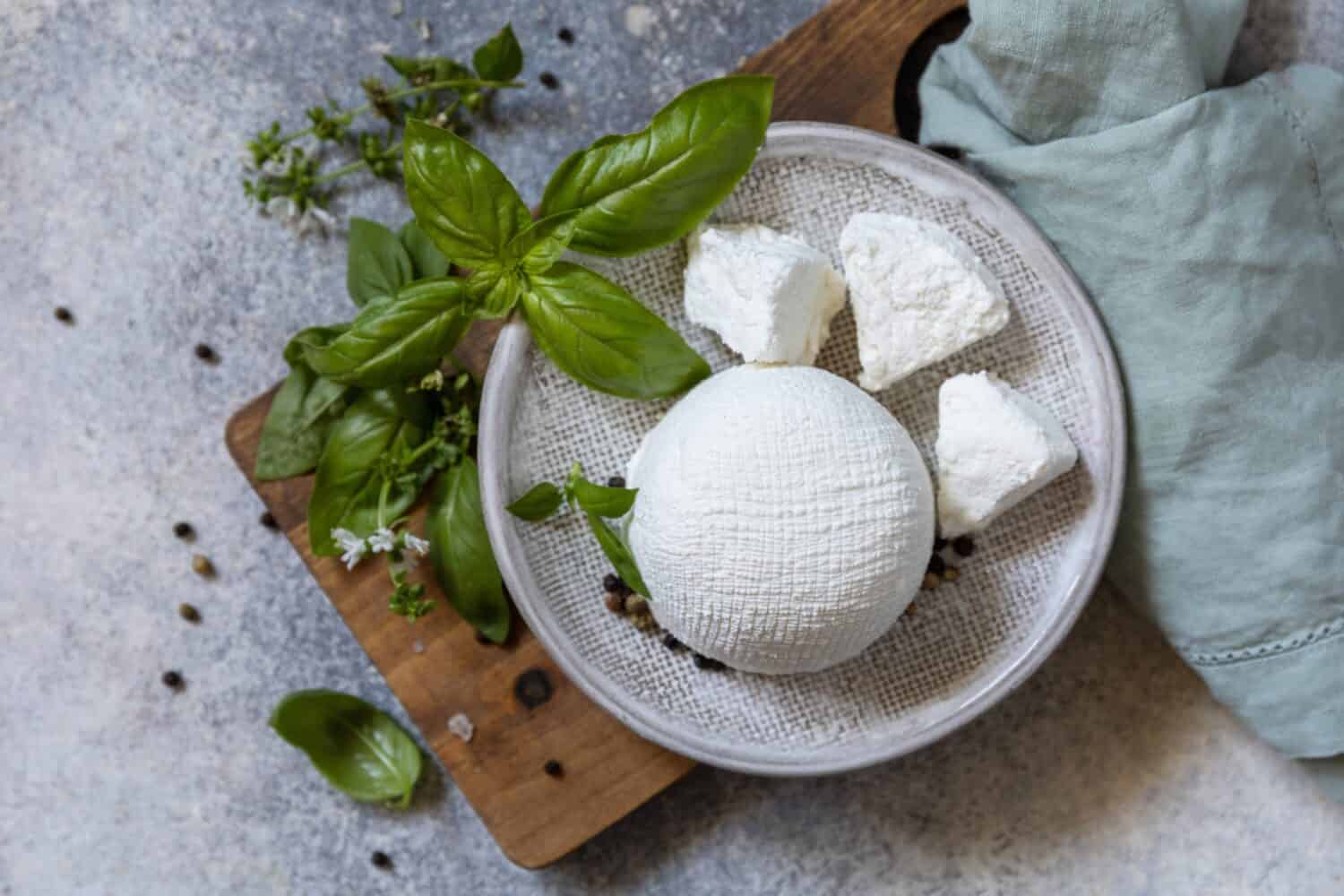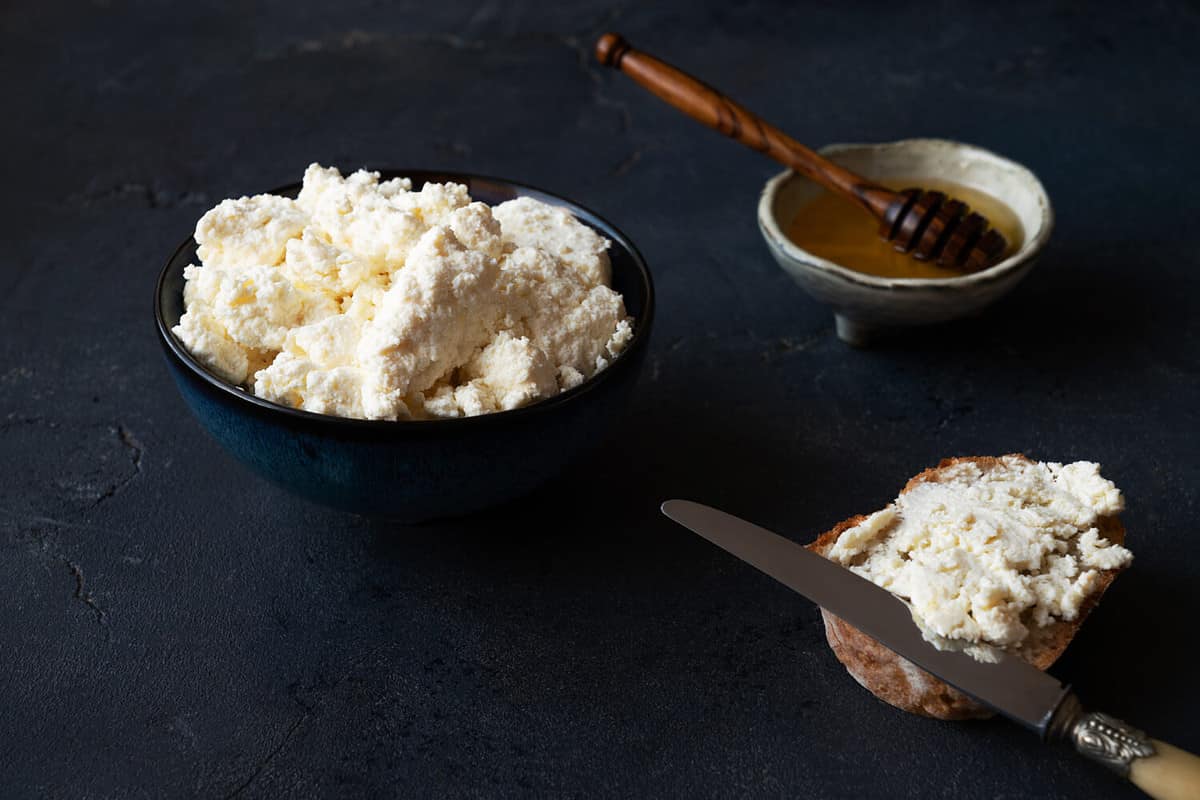There’s something delightfully tasty and versatile about ricotta cheese. Whether you’re layering it in a lasagna, mixing it into a cheesecake, or topping breakfast toast, ricotta can be a game-changer when it comes to depth of flavor. But is ricotta cheese healthy? Believe it or not, it is considered fairly healthy—in reasonable moderation, of course! Though it may not be quite as protein-heavy or low in calories as its cottage cheese counterpart, it is lower in sodium and fat than many other cheeses. From its origins and how it’s made to what it can be used for and its health benefits, we’re looking into the science behind ricotta cheese. Let's dig in!

©Elena Hramova/Shutterstock.com
What is Ricotta Cheese, and Where Does it Come From?
Fun fact, the word ricotta translates to “recooked” in Italian, which gives us a pretty good indication of the cheese's origins. A type of whey cheese, ricotta is separated into two forms during the preparation process—the solid (curds) and liquid (whey). Traditionally, it's made from the small amount of curds that remain in the whey liquid.
Perhaps the most intriguing element of ricotta's story, however, is that it is essentially the leftovers of other cheeses. Hence, the “recooked” reference. Cheesemakers use the curds to make whatever cheeses they intend to, then use the leftover whey for the ricotta. The final product is created by heating it, and then adding milk and vinegar or citrus juice. Once the leftover curds have expanded, they are strained through cheesecloth, and voilà … ricotta! Additionally, the curds can be made from any number of kinds of milk, including sheep, goat, or water buffalo, but the majority of the ricotta we consume and find in the supermarket is made from cow's milk.

©Pedal to the Stock/Shutterstock.com
Ricotta Cheese vs. Cottage Cheese: What is the Difference?
Ricotta cheese and cottage cheese are often thought to be interchangeable—namely, because they are both soft, white, creamy, whey cheeses with curds, rendering them similar in appearance. But the fact remains that they are two different and unique cheeses. In terms of flavor profile, ricotta offers a sweeter taste than cottage cheese, as it contains less sodium. This lends itself equally to desserts and savory dishes, making it a more versatile ingredient. From a textural standpoint, ricotta is made up of small curds, which creates a smooth, mildly grainy mouthfeel. In contrast, cottage cheese has larger curds and contains more liquid. When it comes to nutritional value, however, cottage cheese tends to be the healthier choice. It is typically lower in calories, and it's packed with protein.
What are the Health Advantages and Disadvantages of Ricotta Cheese?
When compared to the majority of its fellow cheeses, ricotta ranks fairly high in the “healthy choice” category. For example, it is lower in salt than options such as blue cheese, brie, and gouda. Also, according to the USDA, only .3 grams of ricotta's carbohydrates are derived from sugars.
Recent studies have also shown that ricotta is associated with favorable insulin and inflammatory response. In other words, it prompts anti-inflammatory properties to combat swelling, as is the case with many dairy products. Here are a few of ricotta's health benefits that are worth noting.
Advantages:
- Low sodium
- A great source of protein
- Possesses a complete amino acid profile
- High in calcium, B12, and other vitamins
- Low on the Glycemic Index
- Contributes to bone health
Disadvantages:
Though it likely goes without saying, we'd be remiss not to mention that ricotta's health benefits are largely dependent on the dish it is incorporated in. Are you mixing it into carb-heavy pasta or whipping it with garlic and fresh herbs for an appetizer dip served with veggies? The latter will likely contain less saturated fat, carbs, and sodium. Additionally, anyone who suffers from dairy allergies or lactose intolerance may find that ricotta isn't quite the “healthy” option they hoped for.

©Alena_Kos/Shutterstock.com
Important Takeaways:
- Ricotta and cottage cheese may appear similar in texture but are made differently.
- Ricotta has been associated with favorable insulin and inflammatory response.
- Studies show that ricotta's health benefits include being low in sodium, high in protein, and low on the Glycemic Index. It also contributes to bone health, thanks to its calcium content.
- Ricotta's health disadvantages include affecting those with dairy allergies and lactose intolerance. Additionally, while it is low in sodium and sugars, it's all in your dish preparation. If you are making ricotta pancakes, for example, it's likely less healthy than putting it on fruit!
Recipe Card
Print
Broccoli Ricotta Mozzarella Stuffed Shells
Ingredients
- 24 jumbo shells, uncooked
- 1 10–oz. package frozen chopped broccoli, thawed
- 1 cup part-skim ricotta cheese
- 1/2 cup shredded mozzarella cheese
- 1/2 teaspoon dried basil
- 1/2 teaspoon dried oregano
- salt and freshly ground black pepper to taste
- 1 (28 ounce) jar Italian pasta sauce
Instructions
- Prepare pasta according to package directions; drain.
- Combine broccoli, ricotta cheese, mozzarella cheese, oregano, basil, salt and pepper.
- Stir together until well blended. Pour about 1 cup of pasta sauce over bottom of 13 x 9 x 2-inch baking pan.
- Spoon 1 round tablespoon of cheese mixture into each shell and place open-side up in an even layer in the pan.
- Pour the remaining pasta sauce over and around shells. Cover pan with foil.
- Bake at 375 degrees F for about 25 minutes until heated through, and serve.
The image featured at the top of this post is ©Elena Hramova/Shutterstock.com.
